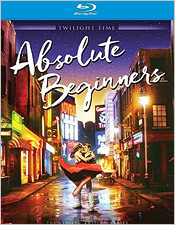Absolute Beginners (Blu-ray Review)

Director
Julien TempleRelease Date(s)
1986 (June 8, 2015)Studio(s)
Orion Pictures (Twilight Time)- Film/Program Grade: B+
- Video Grade: A
- Audio Grade: B-
- Extras Grade: C-
Review
One of the best looking movies of the 1980s gets the Blu-ray presentation it deserves with Twilight Time’s release of Julien Temple’s dazzling pop musical Absolute Beginners. Upon its release in 1986 the film met with mixed responses, to say the least – though it received some positive reviews, its box office failure helped sink Goldcrest, the company that only a few years earlier had triumphed with Chariots of Fire and The Killing Fields. To be fair, it wasn’t an easy sell; simultaneously overstuffed with ideas (mostly visual ones) and so thin on plot and character that there’s no real emotional momentum, Absolute Beginners was and is a chore for audiences looking for a traditional narrative. For those viewers willing to view the film on its own terms, however, it has only improved with age – its meticulous visual design is more striking and original than ever, and its weaknesses as drama seem less egregious in an age when slapdash narratives like Furious 7 and Jurassic World pass muster with hundreds of millions of viewers.
The core story of Absolute Beginners follows two young lovers (played by Eddie O’Connell and Patsy Kensit) whose relationship and idealism are tested when they each get sucked into the mass marketing of 1950s youth culture. The boy is a photographer who sells out his art for big bucks until he comes to his senses; the girl is a model who breaks up with the boy when pairing off with a gay fashion magnate proves to be a better career move. Temple uses the threadbare romance as a jumping-off point for a non-stop parade of incredible set pieces, recreating (or rather, creating, since no place ever really looked like this) 1950s England on back lots and soundstages via elaborately choreographed musical numbers. Temple throws down the gauntlet right from the beginning, with a series of jaw-dropping long takes and tracking shots that would make Scorsese envious; these immaculate celebrations of light, color, and movement would be the high point of most directors’ movies, but Temple is just getting started.
Astonishingly, Temple made his debut as a fiction feature director with the film, following a series of acclaimed music videos and documentaries. He approaches the material with the confidence and skill of a veteran, but his status as a first-timer gives Absolute Beginners an explosive, often unwieldy energy – as the musical numbers shift from one style to another, it becomes clear that Temple is trying to put every idea he’s ever had into one movie. The result is a production so jammed with great moments that the director doesn’t have to linger on any of them; Absolute Beginners not only rewards but demands repeat viewings – it’s the only way to take in all the detail. At times Temple’s ambition gets out of his own control, as in an ill-conceived digression related to racial tensions that feels misplaced even among the many other wild tonal shifts; whenever the focus is on 1950s pop culture and its detritus, however (and that’s most of the time), the movie is a delirious romp.
If Absolute Beginners has a serious flaw as a musical it’s a surprisingly basic one: an absence of memorable songs. Although the movie contains music by popular (at the time of its release, anyway) artists including David Bowie, Sade, The Style Council and others, the tracks feel like rejected B-sides from those performers’ hit singles – the songs get the job done, but no one contributed their best work here. The unremarkable music is obviously a major problem in a film of this type, and undoubtedly a reason it never really took off. Yet Absolute Beginners is a rarity, a film of such rich visual invention that none of its other weaknesses really matter; it doesn’t have the complexity or emotional pull of Bertolucci’s The Conformist or Coppola’s Rumble Fish, but it’s every bit their equal when it comes to the consistency of its imagery. A film is 24 frames a second, and every one of those frames in Absolute Beginners is a work of art you could hang on your wall.
The film’s artistry is on full display on this new Blu-ray transfer, which flawlessly captures all of the bold colors, subtle lighting effects, and rich textures in the movie’s original 2.35:1 aspect ratio. Temple packs his frames with details that previous transfers have left murky at times, but here they’re razor sharp and gloriously vibrant. The 5.1 sound mix is more problematic, with a poor balance between dialogue, music, and effects; in order to hear what the characters are saying one often has to crank the volume, only to be blasted through the wall when the loud songs suddenly kick in. Those songs do sound great though, as does Gil Evans’s jazzy score, which is available on the disc as an isolated audio track. That audio track, alas, is the only extra feature on this bare bones edition, which could have benefited from a commentary by Temple or additional supplements (though there is some useful background information in Julie Kirgo’s fine liner notes). Much as Absolute Beginners itself gets by purely on its visual style, however, this Blu-ray’s omissions are less important than its achievement, which is to present Temple’s gorgeous palette in all its glory.
- Jim Hemphill

